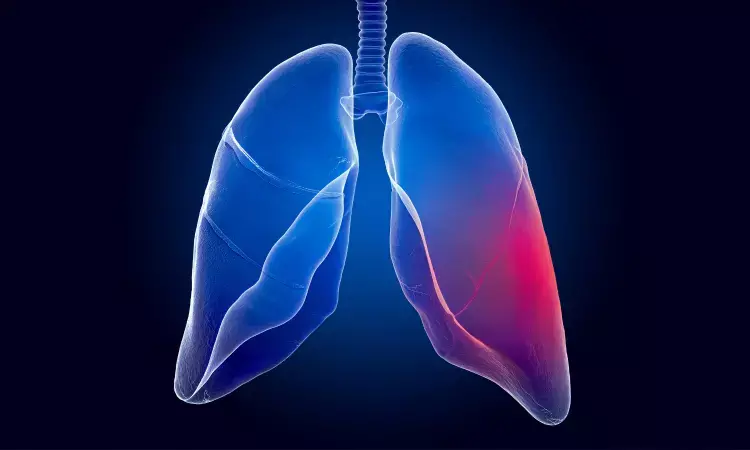- Home
- Medical news & Guidelines
- Anesthesiology
- Cardiology and CTVS
- Critical Care
- Dentistry
- Dermatology
- Diabetes and Endocrinology
- ENT
- Gastroenterology
- Medicine
- Nephrology
- Neurology
- Obstretics-Gynaecology
- Oncology
- Ophthalmology
- Orthopaedics
- Pediatrics-Neonatology
- Psychiatry
- Pulmonology
- Radiology
- Surgery
- Urology
- Laboratory Medicine
- Diet
- Nursing
- Paramedical
- Physiotherapy
- Health news
- Fact Check
- Bone Health Fact Check
- Brain Health Fact Check
- Cancer Related Fact Check
- Child Care Fact Check
- Dental and oral health fact check
- Diabetes and metabolic health fact check
- Diet and Nutrition Fact Check
- Eye and ENT Care Fact Check
- Fitness fact check
- Gut health fact check
- Heart health fact check
- Kidney health fact check
- Medical education fact check
- Men's health fact check
- Respiratory fact check
- Skin and hair care fact check
- Vaccine and Immunization fact check
- Women's health fact check
- AYUSH
- State News
- Andaman and Nicobar Islands
- Andhra Pradesh
- Arunachal Pradesh
- Assam
- Bihar
- Chandigarh
- Chattisgarh
- Dadra and Nagar Haveli
- Daman and Diu
- Delhi
- Goa
- Gujarat
- Haryana
- Himachal Pradesh
- Jammu & Kashmir
- Jharkhand
- Karnataka
- Kerala
- Ladakh
- Lakshadweep
- Madhya Pradesh
- Maharashtra
- Manipur
- Meghalaya
- Mizoram
- Nagaland
- Odisha
- Puducherry
- Punjab
- Rajasthan
- Sikkim
- Tamil Nadu
- Telangana
- Tripura
- Uttar Pradesh
- Uttrakhand
- West Bengal
- Medical Education
- Industry
Higher bicarbonate excretion in cystic fibrosis predicts better lung function and pancreatic sufficiency

Denmark: A study published in the Annals of Internal Medicine has concluded that challenged urine bicarbonate excretion is a new, simple, and safe quantification of CFTR function. The researchers also added that Elexacaftor/tezacaftor/ivacaftor restores renal CFTR function partially in cystic fibrosis patients, which decreases electrolyte disorders and metabolic alkalosis risk.
It is already known that renal base excretion is impaired in cystic fibrosis patients. So considering the biomarker perspective challenged urine bicarbonate excretion may be considered an in vivo biomarker in CFTR (cystic fibrosis transmembrane conductance regulator) function.
Considering this, a study was conducted by Dr Peder Berg and colleagues from the Department of Biomedicine, Aarhus University, Aarhus, Denmark, to evaluate the association between challenged bicarbonate excretion and clinical characteristics at baseline by quantification of the CFTR modulator drug namely elexacaftor/tezacaftor/ivacaftor–induced changes of challenged bicarbonate excretion after six months of treatment. The study also characterized the intraindividual variation in healthy adults.
The conclusive points of the study are:
- The study design was a Prospective observational study.
- The study setting was the Cystic fibrosis clinic at Aarhus University Hospital in Denmark.
- The study included Fifty adult patients with a history of CF and starting CFTR modulator therapy.
- The therapy was started with elexacaftor/tezacaftor/ivacaftor (May 2020 - June 2021).
- The study's measurements quantified urine bicarbonate excretion after an acute oral sodium bicarbonate challenge before and after six months of treatment.
- The challenged urine bicarbonate excretion was found to be associated with several disease characteristics of cystic fibrosis recorded at baseline.
- There was higher Bicarbonate excretion in patients with residual function mutations.
- There was an association between a higher bicarbonate excretion and better lung function.
- There was an association between a higher bicarbonate excretion and pancreatic sufficiency.
- An association was recorded between higher bicarbonate excretion and lower relative risk for chronic pseudomonas infections.
- The treatment with Elexacaftor/tezacaftor/ivacaftor increased bicarbonate excretion by 3.9 mmol/3 h and a 95% Confidence Interval.
- The bicarbonate excretion reached about 70% of that seen in healthy control participants in the present study.
- A correlation was established in healthy control participants; individual bicarbonate excretion (each visit) was correlated with the individual mean bicarbonate excretion.
- The median coefficient of variation was recorded as 31%.
The limitation of the study was a Single-center study, and there was no placebo-controlled group.
The researchers concluded that further investigations are warranted to determine the performance and sensitivity of this approach.
The researchers wrote in our study that early-stage evaluation depicts that challenged urine bicarbonate excretion is a new, simple, and safe quantification of CFTR function. It is also useful to determine the extent of its pharmacologic improvement.
The study results have shown that Elexacaftor/tezacaftor/ivacaftor is responsible for partially restoring renal CFTR function in CF patients. It also reduces the risk for electrolyte disorders and metabolic alkalosis.
The Primary Funding Source of the study was Innovation Fund Denmark, as acknowledged.
Further reading:
Original Research November 2022.Challenged Urine Bicarbonate Excretion as a Measure of Cystic Fibrosis Transmembrane Conductance Regulator Function in Cystic Fibrosis. Peder Berg, MD et al.
BDS, MDS in Periodontics and Implantology
Dr. Aditi Yadav is a BDS, MDS in Periodontics and Implantology. She has a clinical experience of 5 years as a laser dental surgeon. She also has a Diploma in clinical research and pharmacovigilance and is a Certified data scientist. She is currently working as a content developer in e-health services. Dr. Yadav has a keen interest in Medical Journalism and is actively involved in Medical Research writing.
Dr Kamal Kant Kohli-MBBS, DTCD- a chest specialist with more than 30 years of practice and a flair for writing clinical articles, Dr Kamal Kant Kohli joined Medical Dialogues as a Chief Editor of Medical News. Besides writing articles, as an editor, he proofreads and verifies all the medical content published on Medical Dialogues including those coming from journals, studies,medical conferences,guidelines etc. Email: drkohli@medicaldialogues.in. Contact no. 011-43720751


